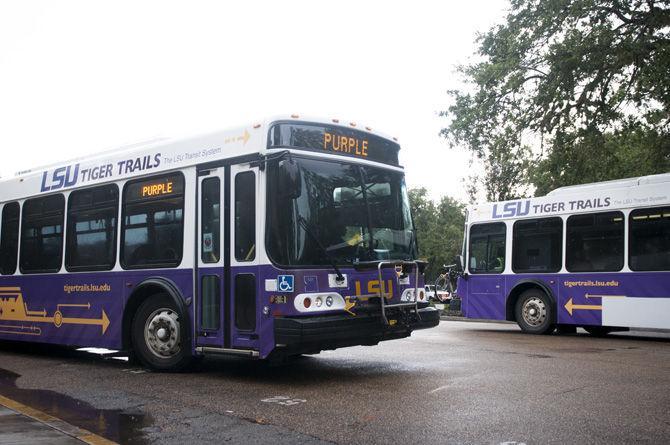A new fleet of Tiger Trails Transit System buses, featuring expanded seating capacity and USB charging ports for passengers, will roll out this summer. The number of vehicles will also be increased by two buses to a total of 25.
Both the full sized buses used for daily service and the smaller shuttles used for late night service will be replaced as part of a new $49 million contract with First Transit. First Transit will handle management, maintenance and the hiring of drivers for the fleet for the next ten years.
“The reason we went to this 10 year contract was to try to eliminate having to go up on student fees [for mass transit],” Administrative Services and Risk Management Senior Director Jeffrey Campbell said.
The transition from a five to ten year contract reduced the cost per hour charged to LSU for bus service, Campbell said.
Business management sophomore Giovanna Bosco said she hoped the new fleet would be accompanied with more buses assigned to routes, and she welcomed the addition of USB charging ports.
“I think that’s awesome. [being able] to charge your phone and other stuff when you’re on the way to school,” Bosco said.
The new buses will also feature improved exhaust systems to lessen the environmental effect of their operation, and a more minimalistic paint job to ease the repair of cosmetic damage.
Campbell said alterations to routes are being considered with the new fleet, including a possible increase in service to Ben Hur Road to cater to the rapidly growing population.
“There’s a lot of new apartment complexes being built out there,” he said. “It’s definitely going to put a strain even with additional buses.”
The first of the new buses will be transported to campus upon completion for viewing by the student body.
Keeping several of the old buses for use as emergency backup when demand is too high is being considered, Campbell said.
Agriculture sophomore Rebecca Dill said the new bus fleet would benefit both students and the environment.
“I love the idea of people’s transportation [being] through the bus or city system. Rather than everyone bringing their own cars,” Dill said. “It’s more fuel efficient.”
Tiger Trails to replace buses, increase fleet
By Trent Parker
January 19, 2016
A Purple Trail bus departs on Thursday, Sept. 10, 2015, from one of its main stops located near the Journalism Building. A new Student Union stop was recently added to this bus route.






